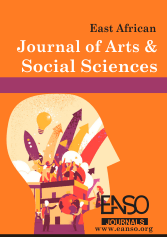Blindness as a Symbolic Trope in Sembene Ousmane’s God’s Bits of Wood (1960)
Abstract
This study interrogated blindness as a symbolic trope in Sembene Ousmane’s God’s Bits of Wood (1960), situating it within the broader literary tradition where blindness transcends physical impairment to signify ignorance, arrogance, and ideological limitation. While classical texts such as Sophocles’ Oedipus the King have long employed blindness to explore paradoxes of sight and insight, its significance in African literature has remained underexplored. The research adopted a qualitative textual analysis, guided by literary symbolism and postcolonial theory, to examine how Ousmane has deployed blindness as a metaphor for colonial oppression, socio-cultural presumptions, and patriarchal constraints. The findings revealed that blindness in the novel functioned on multiple levels. First, it critiqued the assimilationist colonial project that instilled in Africans a sense of inferiority, alienated them from their traditions, and created a form of cultural blindness. Characters who have internalised colonial ideologies have rejected their own heritage and become complicit in structures of domination, exemplifying the destructive consequences of ideological blindness. Second, the trope interrogated gender relations, exposing the blindness of patriarchal assumptions that have confined women to subordinate roles. Through characters such as Ramatoulaye, Penda, Dyenaba, and Maimouna, Ousmane has been used to foreground women’s agency, showing how they transcend traditional limitations to assume leadership and mobilise resistance during the strike. The study was justified by the limited scholarly attention given to blindness as a symbolic trope in African literature, despite its centrality to Ousmane’s narrative. Its significance lies in demonstrating how blindness illuminates intersections of colonialism, gender, and identity while broadening discourse on symbolism in postcolonial texts. The research contributes to literary scholarship by showing how Ousmane reconfigures blindness into a critical aesthetic and political tool for articulating human limitation, resistance, and solidarity.
Downloads
References
Adeyemi, S. O. (2014). Revolutionary aesthetics in Sembene Ousmane’s God’s Bits of Wood. Global Journal of Arts, Humanities and Social Sciences. 2(4). Pp 72-79.
Aziza, R.C (2001). The Relationship between Language Use and Survival of Culture: The Case Umobo Youth Nigerian Language Studies. www.scielo.org.za
Dhanwanthie, H. (2014). Realism in the African novel: the case of Sembene Ousmane’s God’s Bits of Wood, Ngugi wa Thiong’o’s Petals of Blood and Pepetela’s Mayombe.
Emmanuel, U. I. (2013). Socio-economic and socio-cultural reversals in Sembene Ousmane’s God’d Bits of Wood. 4(1). Annals of Humanities and Development Studies.
Frantz, F (1990). The Wretched of the Earth. trans.constance Farrington, Penguin London
Gikandi, S. (1987). Reading the African novel. London. James Curvey.
Jones, A.J. (2000). Fact and fiction in God’s Bits of Wood. Research in African Literatures. 31(2).pp117-131. Indiana University Press. http://www.jstor.org/stabie/3821047
Jernigan, K(1974). Blindness: Is Literature Against Us? National Federation of the blind. Banquet of the annual convedntion. Chicago. http://www.nfb.org
Magesa, L. (1977). The African Religion: The moral tradition of abundant life. Nairobi: Paulines Publications Africa
Robinson, R. (1972). Non-European foundations of European imperialism: Sketch for a theory of collaboration In Roger Owen and Bob Sutcliffe eds. Studies in the theory of imperialism London: Longman, pp 132-137
Wood, J.T. (2008).Gendered Lives: Communication, gender and culture (8th eds.). Belmont: Wadsworth Thomson Learning
Ousmane, S. (1960). God’s Bits of Wood. Oxford: Portsmouth(H.N): Heinemann.
Fanon, F. (1961). The wretched of the earth (C. Farrington, Trans.). Grove Press.
Said, E. W. (1978). Orientalism. Pantheon Books.
Sembène, O. (1960). God’s bits of wood (F. Price, Trans.). Doubleday.
Asante-Darko, K. (2003). Language and culture in African literature. Accra: Ghana Universities Press.
Aziza, R. O. (2001). The relationship between language and culture. In H. Igboanusi (Ed.), Language attitude and language conflict in West Africa (pp. 30–39). Ibadan: Enicrownfit.
Hjarvard, S. (2013). The mediatization of culture and society. London: Routledge.
Rehman, A. (2002). Language and culture. Islamabad: National Institute of Pakistan Studies.
Talib, I. S. (2002). The language of postcolonial literatures: An introduction. London: Routledge.
Wa Thiong’o, N. (1986). Decolonising the mind: The politics of language in African literature. London: James Currey.
Wa Thiong’o, N. (1997). Penpoints, gunpoints and dreams: Towards a critical theory of the arts and the state in Africa. Oxford: Clarendon Press.
Copyright (c) 2025 Sospeter Okero Bichang’a

This work is licensed under a Creative Commons Attribution 4.0 International License.




























